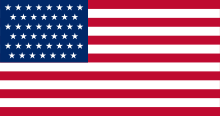1902 in the United States
| 1902 in the United States | |
|---|---|
| Years: | 1899 1900 1901 – 1902 – 1903 1904 1905 |
|
| |
 45 stars (1896–1908) | |
|
Timeline of United States history
| |
Events from the year 1902 in the United States.
Incumbents
Federal Government
- President: Theodore Roosevelt (R-New York)
- Vice President: vacant
- Chief Justice: Melville Fuller (Illinois)
- Speaker of the House of Representatives: David B. Henderson (R-Iowa)
- Congress: 57th
Events
January–March
- January 1 – The first college football bowl game, the Rose Bowl between Michigan and Stanford, is held in Pasadena, California.
- January 8 – A train collision in the New York Central Railroad's Park Avenue Tunnel kills 17, injures 38, and leads to increased demand for electric trains.
- January 28 – The Carnegie Institution is founded in Washington, DC with a $10 million gift from Andrew Carnegie.
- February 18 – U.S. President Roosevelt prosecutes the Northern Securities Company for violation of the Sherman Act.
- February 22 – Senators Benjamin Tillman and John L. McLaurin, both of South Carolina, have a fist fight while Congress is in session.[1] Both Tillman and McLaurin are censured by the Senate on February 28.
- February - The Yellow Fever Commission announces that the disease is carried out by mosquitoes
- March 10 – A Circuit Court prevents Thomas Edison from having a monopoly on motion picture technology.
April–June
- April 2 – Electric Theatre, the first movie theater in the United States, opens in Los Angeles, California.
- April 7 - The Texas Oil Company Texaco is founded.
- May 15 – It is claimed that in a field outside Grass Valley, California, Lyman Gilmore achieves flight in a powered airplane (a steam-powered glider). There is no surviving evidence to verify this claim.
- May 20 – Cuba gains independence from the United States.
- June 2 – The Anthracite Coal Strike begins in the United States.
- June 15 – The New York Central railroad inaugurates the 20th Century Limited passenger train between Chicago and New York City, New York.
- June 17 – The Newlands Reclamation Act funds irrigation projects for the arid lands of 17 states in the American West.
July–September
- July 1 – The Philippine Organic Act becomes law. It provided that the lower house of the Philippine legislature would be elected after the insurrection ended.
- July 4 – The Philippine–American War ends.
- July 10 – The Rolling Mill Mine disaster in Johnstown, Pennsylvania kills 112 miners.
- August 22 – Theodore Roosevelt becomes the first American President to ride in an automobile when he rides in a Columbia Electric Victoria through Hartford, Connecticut.
- September 19 – Shiloh Baptist Church disaster: 119 people are killed during a stampede at the church in Birmingham, Alabama.
October–December
- October 21 – In the United States, a five-month strike by the United Mine Workers ends.
- October 24 – Delta Zeta Sorority is founded at Miami University in Oxford, Ohio.
- November 30 – American Old West: The second-in-command of Butch Cassidy's Wild Bunch gang, Kid Curry Logan, is sentenced to 20 years hard labor.
- December – The Venezuela Crisis of 1902–1903 occurs (until February 1903), in which Britain, Germany and Italy sustain a naval blockade on Venezuela in order to enforce collection of outstanding financial claims. This prompts the development of the Roosevelt Corollary to the Monroe Doctrine.
Undated
- The Potawatomi Zoo (the oldest zoo in Indiana) opens in South Bend.
Ongoing
- Progressive Era (1890s–1920s)
- Lochner era (c. 1897–c. 1937)
- Philippine–American War (1899–1902)
Births
- February 13 – Blair Moody, United States Senator from Michigan from 1951 till 1952. (died 1954)
- February 27 – John Steinbeck, author (died 1968)
- March 24 – Thomas E. Dewey, 47th Governor of New York, 1948 Republican presidential nominee (died 1971)
- April 2 – David Worth Clark, United States Senator from Idaho from 1939 till 1945. (died 1955)
- July 4 – George Murphy, United States Senator from California from 1965 till 1971. (died 1992)
Deaths
- February 18 – Charles Lewis Tiffany, founder of Tiffany & Co. (born 1812)
- August 10 – James McMillan, Canadian-born U.S. Senator from Michigan from 1889 to 1902 (born 1838)
- October 26 – Elizabeth Cady Stanton, suffragist (born 1815)
- November 27 – George S. Cook, prominent early American photographer (born 1819)
- November 29 – John Elliott Ward, politician and diplomat (born 1814)
- December 14 – Julia Grant, wife of President Ulysses Grant, First Lady of the United States (born 1826)
- December 22 – Dwight M. Sabin, U.S. Senator from Minnesota from 1883 to 1889 (born 1843)
See also
References
- ↑ Times, Special To The New York (23 February 1902). "SENATORS FIGHT ON SENATE FLOOR; McLaurin and Tillman of South Carolina Come to Blows. BOTH ADJUDGED IN CONTEMPT They Apologize, but Committee Will Pass on the Affair. Fisticuffs Followed McLaurin's Assertion That Tillman Had Lied About Him in the Course of Philippine Debate.". Retrieved 12 November 2016 – via NYTimes.com.
Further reading
- American Annual Cyclopaedia ... 1902, NY: D. Appleton & Co. – via HathiTrust
- "Domestic Chronology", Statistician and Economist, San Francisco: Louis P. McCarty, 1905, pp. 227–347 – via HathiTrust. (Covers events May 1898-June 1905)
External links
-
 Media related to 1902 in the United States at Wikimedia Commons
Media related to 1902 in the United States at Wikimedia Commons
This article is issued from Wikipedia - version of the 11/17/2016. The text is available under the Creative Commons Attribution/Share Alike but additional terms may apply for the media files.